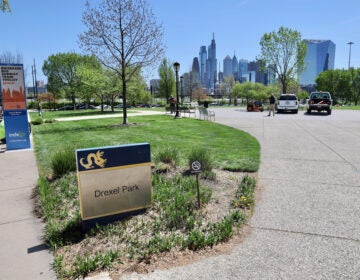Willingboro officials break ground on system to remove toxic ‘forever chemical’ from drinking water
Several months after discovering elevated levels of PFOS in a Willingboro well, officials are breaking ground on a new treatment system.

Willingboro officials break ground for a $5.3 million water treatment plant that will remove PFOS contaminants from the township's drinking water. (Emma Lee/WHYY)
Residents in Willingboro, Burlington County, were told in December 2021 that their water supply contained elevated levels of a toxic “forever chemical” that has been linked to health problems, including some cancer and birth defects.
The municipal well in question contained PFOS, or perfluorooctane sulfonate, which is a member of a group of human-made chemicals called PFAS (per- and polyfluoroalkyl substances). These chemicals can stay in the environment for years without breaking down.
After municipal authorities detected the elevated levels, affected residents were connected to the city’s other wells. Now, the township is taking steps to permanently resolve the issue.
Willingboro Municipal Utilities Authority broke ground Monday on a new system to remove the chemical from the drinking water. Completion of the $5 million project is expected in September of 2023.
“Many of us didn’t know that initially there was an issue with the water. And so to know that the township is on it, they’re moving forward to make sure that we’re safe, of course, there’s relief,” said resident Amy Dean. “We need to do our due diligence and follow up, attend the meetings, and find out exactly what’s going on.”
PFOS was found in the well at an average of 15 parts per trillion. New Jersey, which has one of the most stringent PFAS restrictions in the country, sets a limit of 13 parts per trillion. The Environmental Protection Agency has a health advisory level of 70 parts per trillion, however, some advocates argue that the threshold is not high enough.
Pennsylvania and Delaware recently announced proposals to establish maximum contaminant levels, or MCLs, for the compounds in drinking water.

For decades, PFAS (per- and polyfluoroalkyl substances) have tainted the water, air, and soil in this region and across the country. These so-called “forever” chemicals are widely used in consumer products, such as nonstick cookware, flame-retardant fabrics, and some food packaging, as well as in firefighting foam used at current and decommissioned military bases. The contamination has had a significant impact on residents in our region, like Bucks and Montgomery counties in Pennsylvania, Monmouth County in New Jersey, and Dover and Blades in Delaware.
The numerous health problems, including some cancers, linked to PFAS have led to lawsuits against companies that make the products, such as DuPont and its successor companies, and 3M.
The contamination source is still unknown, said Jim Mackie, executive director of the Willingboro Municipal Utilities Authority. Unlike other areas that face much higher levels of PFAS than in Willingboro, the New Jersey town is not located near airports or military bases that historically used firefighting foam.

“There is no obvious culprit. So it won’t be an easy exercise,” Mackie said. “It will have to take a lot of analysis to figure out. You might have to do monitoring wells and other things to find the plume or where it’s coming from.”
WHYY is your source for fact-based, in-depth journalism and information. As a nonprofit organization, we rely on financial support from readers like you. Please give today.








